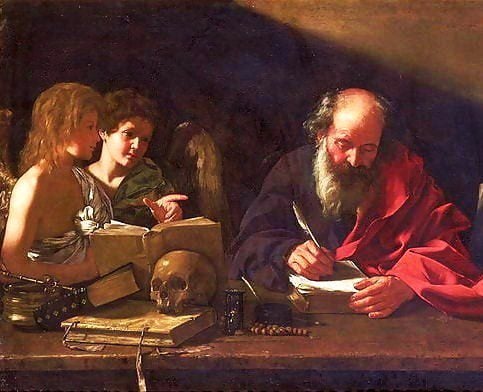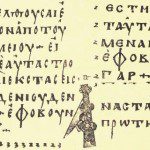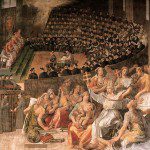
St. Jerome Visited by Angels, by Bartolomeo Cavarozzi (1587-1625) [public domain / Wikimedia Commons]
(11-27-07)
My good friend and fellow Michigander apologist Gary Michuta, in his excellent book, Why Catholic Bibles are Bigger (Port Huron, Michigan: Grotto Press, 2007), observed about St. Jerome:
Jerome is the first of the Western Fathers to deny the inspired status of the Deuterocanon; the first to unabashedly designate them apocrypha instead . . . Jerome’s new canon was an innovation — and he knew it. (p. 142)
Protestant apologists often attempt to make Jerome the spokesman for a large silent majority of knowledgeable Christians in his day; this opinion is supported by no evidence whatsoever. Protestant scholars have long admitted that Jerome was essentially alone in his opposition to the Deuterocanon . . . It was also a decisive break from the practice of the ancient Christian Church. (p. 145)
But even with Jerome, there were several anomalies (or changes of mind or vacillations?), of such a nature that they would shock many a Protestant who rely on him as a “champion” in opposing the Deuterocanon. Michuta enumerates several of these curious inconsistencies:
He . . . flatly denies that Tobit is part of the canon, [1] although elsewhere he cites it without qualification! [2] . . . Jerome adopts the popular convention in his Letter to Oceanus by quoting Baruch as a voice made by “the trumpets of the prophets.” [3] Sirach is both rejected and quoted as Scripture, [4] although it is formally quoted [5] and occasionally used without qualification. [6] Wisdom is also occasionally formally quoted. [7] Jerome even attributes the passages from Wisdom to the Holy Spirit. [8] Maccabees is used without distinction. [9] Jerome at times alludes to the Deuterocanonical sections of Daniel in his letters. [10] Deuterocanonical passages from Esther are likewise quoted. [11] . . . he lists Judith as one of the virtuous women of sacred Scripture . . . [12].
[1] Prologue to John.
[2] Commentary in Eccles. 8.
[3] Letter 77:4.
[4] Commentary on Isaiah, Book 2, 3:12; Letters 77:6: 108:22; 118:1; 148:2,16,18.
[5] Commentary on Jeremiah, Book 4, 21:14; Commentary on Ezekiel, Book 6, 18:6; and Letter 64:5.
[6] Commentary on Isaiah, Book 8, 24:4; Commentary on Ezekiel, Book 6, 18:6; Letter 57.1 To Pammachius; and Letter 125.19, To Rusticus.
[7] Commentary on Isaiah, Book 1, 1:24; Commentary on Zechariah, Book 3, 14:9; and Commentary on Malachi, 3:7 ff.
[8] Commentary on Galatians, Book 1, 3:2 . . . and Breviarium in Psalmos, Ps 9.
[9] Against Pelagians, Book 2:30; Letter 7, To Chromatius, Jovinus and Eusebius.
[10] Letter 3, 1 To Rufinus the Monk; Letter 22,9-10, To Eustochium; Letter 1, 9 to Innocent.
[11] Letter 48, To Pammachius, 14.[12] Letter 65,1.(Ibid., 149-150; my own footnote numbering)
Gary Michuta [see also his Facebook page] now has a second book on this subject, called, The Case for the Deuterocanon: Evidence and Arguments (2015). His two volumes are the very best current Catholic sources available regarding the deuterocanonical books.













